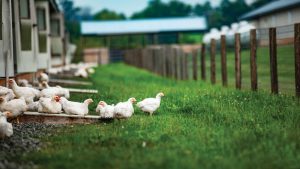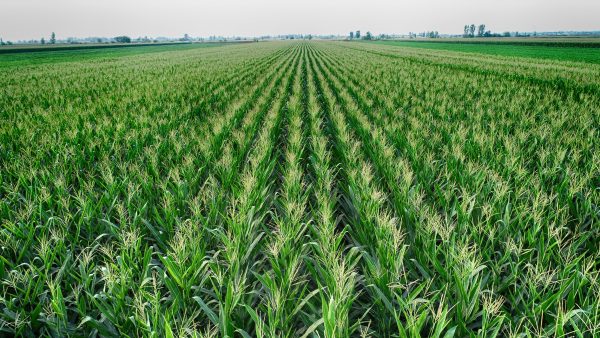Organic poultry producer needs to increase supply of U.S. domestic corn and soybeans to feed its chickens

Bell & Evans’s organic chickens
U.S. grain farmers have a new incentive to transition from conventional to organic practices as Pennsylvania-based poultry producer Bell & Evans recently announced a partnership with Cargill and the Rodale Institute to transition 50,000 acres of farmland to organic production. Bell & Evan’s U.S. Organic Grain Initiative aims to increase the supply of domestic organic grains, which could help make the U.S. organic market less reliant on imported organic corn and soybeans.
Bell & Evans owner Scott Sechler says his company is seeing significant growth in its organic chicken program, which is increasing its need for U.S. grown certified organic corn and soybeans used in its chicken feed.
“Our initiative is to try to get more farmers to convert. The pace of growth is now to the point where for us to find grain in the U.S. the market is getting tighter and tighter,” Sechler says.
In 2020, Bell & Evans experienced 25% growth in organic chicken sales and projects growth of 27% in 2021 and 17-20% each year after that, through 2024.
To accommodate the growth, Bell & Evans is also building a new 411,500 square foot organic certified chicken harvesting facility in Fredericksburg, Pennsylvania.
While organic products account for four percent of total food sales in the U.S., only one percent of total U.S. farming acreage is certified organic. As a result, the organic industry, particularly poultry producers, must rely on imported corn and soybeans to feed their flocks. According to Ryan Koory, senior economist at Mercaris, an organic and non-GMO market data firm, the U.S. imports about 23% of the organic corn and 78% of the organic soybeans and soybean meal used for feed.
Bell & Evans has been committed to sourcing 100% U.S. organic grains for its organic chicken feed since the inception of its organic chicken program in 2009.
“We are buying only American organic grains,” Sechler says. “We want to know what farms it came from, how it was transported, where it was stored, and how it got railed in from the Midwest to our mill. We want to make sure that when we tell customers that Bell & Evans is certified organic chicken, that the grains were certified, and we know that.”

Bell & Evans is building a new 411,500 square foot organic certified chicken harvesting facility
Bell & Evans is working with Cargill on the initiative because they have been a long-time supplier of the company’s organic feed. Cargill has a certified organic feed facility in Winfield, Pennsylvania.
According to Jeff Vassart, managing director for Cargill’s agricultural supply chain in North America, Cargill brings many resources such as specialty market capabilities to help farmers make the transition.
“We are optimistic that Cargill can add value to the organic farming sector via the partnership. Cargill has a long history of providing growers with consistent access to new and emerging markets,” he says.
Under the agreement with Bell & Evans, Cargill will help farmers to transition acreage from conventional to organic through subsidized organic crop consulting services provided by Rodale Institute. Cargill will also offer market access for transition crops, and farmers are guaranteed a market for their certified organic grains through Bell & Evans.
“Cargill will manage the farmer contracting, handling, and merchandising of the organic grain,” Vassart says.
Rodale will consult with farmers on the transition
At first glance, a partnership between Cargill, one of the world’s largest agribusiness companies, and organic pioneer Rodale might seem odd, but Sam Malriat, Rodale’s director of crop consultancy, says it makes sense.
“Our mission is to transition as many acres as possible to organic production,” he says. “It was an opportunity for us to expand our mission. For us, that’s a big step forward.”
Rodale Institute brings more than seven decades of scientific organic agriculture research to the partnership, offering added value and security to farmers who participate.
Malriat says Bell & Evans’ commitment to transition 50,000 acres will have a big impact to advance organic production.
“That’s a huge commitment from any producer to be able to say we are only going to buy domestic organic grain. When large producers make those decisions, it really creates positive effects on everyone down the supply chain.”
Rodale will provide a range of its crop consulting services to the transitioning farmers including crop rotations; cover crop, weed control, and equipment recommendations; soil fertility; networking with other growers to share information, and the latest organic research.

Sam Malriat (center), Rodale’s director of crop consultancy, consults with farmers transitioning to organic
The two biggest challenges facing transitioning farmers are weed control and compliance with the organic rules, areas in which Rodale provides expertise.
Rodale is already receiving inquiries from farmers about the transition initiative.
“Interest is coming from everywhere, not just young farmers, not just corn and soybean farmers,” Malriat says. “I’m really encouraged by the fact that everyone seems to be interested in soil health.”
Vassart says Cargill has already acquired new organic farmers. Farmers in any phase of the three-year transition are eligible for the Bell & Evans program as well as organic farmers who want to expand their production.
“Good to see interest from the food industry focused on organic”
Bell & Evans’ initiative is the latest in a series of commitments made by large companies to transition farmland to organic production in the past few years. In 2015, Ardent Mills, North America’s leading flour supplier, launched an initiative to double the number of organic wheat acres by 2019. In 2016, General Mills announced a plan to double the organic acreage from which it sources ingredients. Two years later, General Mills engaged in a strategic sourcing arrangement to transition the 34,000-acre Gunsmoke Farms in South Dakota to organic. In 2019, Anheuser-Busch launched a “Contract for Change” initiative to help farmers transition to organic barley production for the company’s Michelob Ultra Gold organic beer.
According to Koory, large organic transition initiatives can accelerate the growth of organic farming and food in the U.S.
“If you think about the prospect of organics becoming a substantial and sustained part of the U.S. food supply, it’s going to require people like Bell & Evans and Cargill,” he says.
Koory is concerned about too much emphasis on corn and soybeans when organic farmers have other crops in their rotations they will need to sell.
“We really need to be focused on more than just expanding organic corn and soybean acres,” he says. “They need to be holistic in considering how to continue having rotational systems and support farms that grow rotational crops?”
Malriat agrees. “Yes, we are hoping farmers could put more crops in those rotations, wheat, alfalfa and other crops, especially cover crops.”
Sechler says that helping farmers find markets for their other rotational crops is an important part of their initiative.
“Someone has to work with these farmers to grow hemp, wheat or other products. Cargill has worldwide marketing of grains, and they will be able to market those products in the U.S. and around the world.”
Vassart says Cargill will help farmers sell their transitional crops. “Growers that have non-GMO corn or soybean production as part of their transition period can market those items directly Cargill.”
Bell & Evans says it wants its U.S. Organic Grain Initiative to be a “model for the rest of the food industry.” Sechler emphasizes the importance of assuring customers about the organic integrity of their products.
“Part of our plan with Rodale and Cargill is to really put some truth and honesty into the program. So those customers who are willing to pay for organic can feel comfortable that they are getting what they paid for.”







